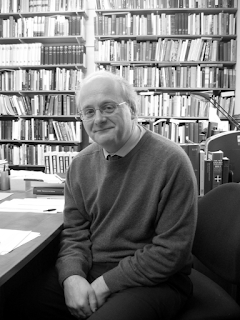John Bainbridge Webster went to be with his Lord yesterday. He was only 60 years old.
I remember how I felt when John Stott died in the summer of 2011. I felt sad that the church militant had lost a great warrior, that the pilgrim church had lost a great under-shepherd. I felt that I personally had lost one of my literary mentors. I feel that way again.
I regret that I came to Webster's work only relatively recently, but I have been immensely blessed by his writing in that short time. Webster's work is rigorously intellectual but serves a practical ministerial purpose: to magnify the glory of the triune God through exploring the gospel of Jesus Christ in God's written Word, given through the Holy Spirit for the people of God whom he indwells, the church.
"Dogmatics is often caricatured as the unholy science that reduces the practices of piety to lifeless propositions. But far from it: dogmatics is that delightful activity in which the Church praises God by ordering its thinking towards the gospel of Christ. Set in the midst of the praise, repentance, witness and service of God's holy people, dogmatics - like all Christian theology - directs the Church's attention to the realities which the gospel declares and attempts responsibility to make those realities a matter of thought."
- Holiness, p. 8
"The matter to which Christian theology is commanded to attend, and by which it is directed in all its operations, is the presence of the perfect God as it is announced in the gospel and confessed in the praises and testimonies of the communion of saints."
- Confessing God, p. 1
Here is an anecdote posted by Alan Jacobs. This is my kind of theologian! This account relates better than any explanation why Webster was just the sort of theologian to combat Liberal and unbelieving theology, something which he did without ever being shrill or alarmist. He saw error for what it was and wasn't afraid of being looked down upon by ivory-tower types in the academy. Webster was the right kind of theologian to combat error, not because he focused his efforts on fighting the errors but because he focused on expounding the truth in all its layered magnificence and power. This he did in a winsomely articulate way, able to tailor his writing to the audience he was addressing. And from the testimony of others and from my own experience of his writing (regrettably limited thus far), he did this from the ground of a deep, personal and humble faith.
What is our loss is Webster's gain.
"For now we see through a glass, darkly; but then face to face: now I know in part; but then shall I know even as also I am known."
- 1 Corinthians 13:12

No comments:
Post a Comment